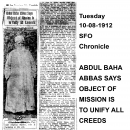Main menu
- ‘Abdu’l-Bahá’s Journey
- World Peace
- Stopping Racism in America
- Empowerment of Women
- More Principles...
- Prayer for America
‘Abdu’l-Bahá Abbas Says Object of Mission Is To Unify All Creeds
[picture caption: ‘Abdu’l-Bahá Abbas, the Persian religious teacher, who is lecturing in this city.]
Great Persian Religious Teacher Explains His Life’s Ambition
“WHAT Christianity has failed to accomplish Bahá’ísm already has accomplished. It has 3,000,000 adherents throughout the world. It teaches the oneness of mankind and the fundamental unity of all religions. It has been said that no religious movement of the time is so significant as is this one, and you will hear today the greatest living exponent of this movement, a man who is a leading figure in the religious world today.”
It was in these words that Rev. Bradford Leavitt on Sunday morning introduced to an audience that filled the First Unitarian Church. ‘Abdu’l-Bahá Abbas, who from a prison in the Far East has come into the West to preach the religion of his father, Bahá’u’lláh, founder of the Bahá’í movement in Persia in 1844, and who, persecuted and imprisoned, died in the captivity that later claimed his son — the venerable man who yesterday for the first time spoke in San Francisco.
SEEKS NO CONVERTS.
It was a message of peace and love and unity that ‘Abdu’l-Bahá delivered to the people of this city. His address — of perhaps it would be more correct to call it a sermon — was a short one and spoken through an interpreter, but in it he sought to tell the people the fundamentals of his religion. It is not, he carefully explained, any new religion. He seeks no converts from other churches. Rather does he seek only to unify all churches of all creeds and of all denominations. He seeks, he said, to have men cull from each religion, be it Christian, Buddhism or the teachings of Confucius, the very best there is in it, making of them all one perfect whole. And he clearly pointed out that in so doing no man need forsake the creed to which he had given his allegiance. Rather would the acceptance of the Bahá’í faith strengthen one’s allegiance to the church that he belonged to.
For the sake of his faith and the surety that his father’s belief in the ultimate coming of universal peace, love and unity would be realized. ‘Abdu’l-Bahá lingered in prison for forty years, his release not coming until 1908. Even then he remained in confinement at Akka, in Palestine, for two years longer, voluntarily and because his friends were there and he was loth to leave them.
A picturesque figure is that of ‘Abdu’l-Bahá. His clean-cut, scholarly features framed by a patriarchal white beard and a white turban, he looks like one of the prophets of Biblical days. He speaks slowly and as one certain that each word he utters breathes the very spirit of truth.
WILL STAY TWO WEEKS.
‘Abdu’l-Bahá will remain in this city for a couple of weeks. While here he is being cared for by the local Bahá’í Assembly, numbering some 500 members. He has spoken in London, where he was introduced to the Church of England by Archbishop Wilberforce, and the Persian spoke from the pulpit of St. John’s, Westminster, London. The Lord Mayor of London entertained him at a great banquet, and the courtesies he was shown abroad he also received in New York, Chicago and other Eastern cities.
This afternoon ‘Abdu’l-Bahá will speak at the Leland Stanford Junior University, Palo Alto; Wednesday he will speak at the Home of Truth, Berkeley; Thursday evening he will speak before the Forum Club in Jefferson Hall, this city; Friday evening he will address the Theosophical Society in Yosemite Hall, Native Sons building, this city; Saturday morning he will speak in Temple Emanu-El, and next Sunday afternoon he will make an address to the blind in the reading-room at 1665 Jefferson street.









